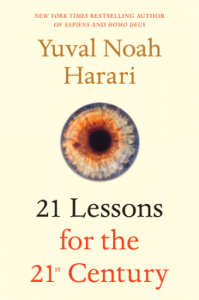Monday
UncategorizedKnow Thyself (Or the algorithms will do it for thee)
 A review of the bestseller by Yuval Noah Harari, by Stephen Gleitch
A review of the bestseller by Yuval Noah Harari, by Stephen Gleitch
What does a brilliant, Israeli, Oxford educated, gay, 42-year old historian who has meditated daily for 20 years, and has written two best-sellers have to teach us about how to live in this age of disorienting change and bewilderment?
Last fall, a loosely organized non-fiction book club in our village gathered to read Yuval Noah Harari’s 21 Lessons for the 21st Century. We chose this book, which is based on essays Harari wrote between 2012 and 2017, for its big ideas, short chapters, and the strong reputation of its author. The twelve of us found Harari’s book very challenging, sometimes overwhelming, always stimulating, and relevant to our daily lives and the world around us. What follows are a few highlights, teasers only, for the reader curious about the inner and outer experience of this overwhelming age.
The feeling of being overwhelmed arose in many of us as we worked through the chapters. This feeling is itself one of the author’s central observations about our times. He writes of the “constant and disorienting change” we are living through in this “…age of bewilderment”. We can become lost in a “tidal wave of disillusionment” easily. Hence, the need for lessons.
His views are not neatly characterized as left or right on the usual political spectrum. His skepticism, vast general knowledge, and openness about his personal experience are his biggest gifts to the reader. Do not, however, expect quick or simple answers.
The 21 essays address current issues like climate change, artificial intelligence, bigotry and hatred, social media, nationalism, community, war, ethics, equality, religion and secularism. I will touch on three chapters briefly – liberty and big data, secularism and its shadow, and meditation – in order to whet your appetite for more.
In the chapter entitled “Liberty”, Harari looks into some of the effects of biotechnology, big data, artificial intelligence and their algorithms. He concludes that our minds, our attention, and “who we are” are being altered as technology gains the ability to “hack and manipulate the human heart”. Where is our liberty then?
He projects these developments into the near future. He imagines, for example, an algorithm that would indirectly locate us, using subtle eye movements and other on-line indicators, on a hypothetical “gay/straight spectrum”. Will Coca Cola want that data in order to tailor its on-line advertising to the individual’s resulting profile? By showing the “shirtless guy or the shirtless girl” without the viewer even knowing that her/his orientation was in their sights. But Coca Cola will know and the “knowledge will be worth billions.” Will widespread use of such algorithms make us irrelevant? Where is the freedom in that?
Chapter 14 is entitled “Secularism”. Its subtitle is unexpected: “Acknowledge your shadow”. He defines the essence of secularism as the search for truth. And the ethical value is maximum thriving and minimal harm. While he holds these secular values in high regard, he points out that any belief system can develop a shadow, a blind spot, a dark side. In this regard, he advocates humility. Are we willing to review our assumptions when mistakes (of our religion, our ideology, or worldview) occur? Are we, in what Harari asserts is the secular tradition, willing to admit ignorance when things go south? Or do we claim infallibility?
As I reflect on Shambhala in this light and apply what Harari offers based on his reading of history, it means to look fearlessly into our culture and our assumptions. Do our unique and brilliant teachings (on meditation, society, and tantra) convey some kind of special status on us? Are we immune from societal “shadows” of sexism, male privilege, or puritanical self-righteousness? Recent events tell us “no”. Harari advises us to look and then to look again.
This encouragement to look into our shadow side is also found in our own teachings on Enlightened Society and in our meditation instruction. Harari takes a strong stand here on relating to this shadow world. Societies and cultures must look fearlessly into their collective mistakes with humility and curiosity. Otherwise, Harari says, “I, for one, would not trust you.”
Finally, in Chapter 21, “Meditation,” Harari writes about his inner life. He relates the story of his interest in and 20-year practice of meditation. He states, “…it is only fair that I put myself in the firing line too, and explain how somebody so skeptical still manages to wake up cheerful in the morning.”
Most readers of this journal can relate to the experience of finding a practice – in Harari’s case, the vipassana tradition as taught by S.N. Goenka – that opens the mind itself to appreciative, fearless inquiry. What a relief!
He found that working directly with the mind itself, rather than trying to resolve each and every discrepancy, doubt, emotion and contradiction was the path for him. Meditation is based on letting go of the story line (everything in the first 20 chapters, by the way) and to work with mind directly. He states, “Escaping the narrow definition of self might well become a necessary survival skill in the twenty-first century.”
Connecting this practice to the issues around big data and biotechnology he addresses in earlier chapters, he exhorts us, “We had better understand our minds before the algorithms make our minds up for us.”
I have left out a lot, highlighted some chapters I resonated with especially, and definitely recommend this book to you. Harari’s sharp and skeptical intellect is on full display. The alert reader will undoubtedly feel the rug being pulled out from under foot more than once in these 21 chapters. Not easy but worth it. A journey we can relate to. And insights worth contemplating.
You can find Harari’s book available for sale on his website here.
 Shastri Steve Gleich feels very fortunate to have received teachings from Chogyam Trungpa Rinpoche and Sakyong Mipham Rinpoche and their senior students and to have been in the Shambhala Buddhist world since 1982. He is now retired from 30+ years career in psychology and mental health and 10+ years career as woodworker. He has been married to Lilly for 38 years, and they are now living in Tatamagouche, Nova Scotia. He continues to volunteer with Dorje Denma Ling, Tatamagouche Shambhala Meditation Group, Dorje Kasung Land Group, and the local food bank.
Shastri Steve Gleich feels very fortunate to have received teachings from Chogyam Trungpa Rinpoche and Sakyong Mipham Rinpoche and their senior students and to have been in the Shambhala Buddhist world since 1982. He is now retired from 30+ years career in psychology and mental health and 10+ years career as woodworker. He has been married to Lilly for 38 years, and they are now living in Tatamagouche, Nova Scotia. He continues to volunteer with Dorje Denma Ling, Tatamagouche Shambhala Meditation Group, Dorje Kasung Land Group, and the local food bank.





Mar 8, 2020
Reply
Thank you Steve. I love the idea of a book club! I will not say I will read this book, even though Harari’s books has been on my list for some time but you definitely wetted my appetite. Maybe starting a book club is a good place to start as a way to heighten our awareness of the inevitable shadows and hopefully come to practice more humility by studying a mixture of dharma and Shambhala books and authors with wisdom from many other traditions and fields! ” The algorithms ” hmmm, I’ve found myself leaning more and more towards dropping out of social media, thinking of not buying a new smartphone and eventually returning to a good old dumb one and yet the possibility technology, social media and such brings are so fascinating and also seem to bring good things into the world. I guess the choice must be an individual one in the end: do these tools work benefit me more or d0 they distract me more? Do they help me help others better, to be of service to my fellow human ( and other beings) or do they steal my energy and make me dumber? I definitely want an old wired phone again, so I can turn of the wifi from time to time and still be reached by those who need me :) Warm wishes
Mar 6, 2020
Reply
Thank you, Steve, for pre-digesting a bit of Harari’s latest offering. I so enjoyed “Sapians” and the course he offered through one of the MOOC’s I encountered. He’s brilliant, and I may order the book shortly and have a go.
Best wishes,
Sylvie in AZ
Mar 6, 2020
Reply
Thank you Steve, i will read this book. I especially resonate with the importance of inner shadow work both as individuals and for communities. I have also felt disillusioned and overwhelmed by the sense that algorithms are taking over our institutions, elections….. And most of all i heard what you said about humility, and the need to work with our minds and expand, beyond our narrow selves at this time….